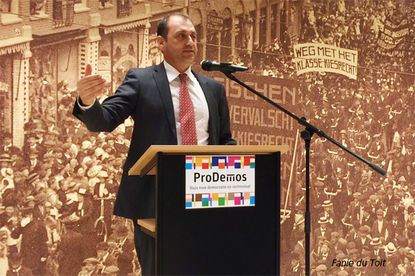
Imagine that you are a leader in a tough position. You’re a board member facing a huge transition resisted by many. You are a teamleider dealing with fury from the past. Or you have your own business and have to deal with one or more clients who are really dissatisfied. What do you do? You have your own ideas about your employees, team members or clients. And you are probably right. But to simply hang on to these ideas doesn’t bring you one step further. At the end you want to reach your goal: make the transition with motivated people or keep partnering with your clients. How can you achieve that? Or in other words: how can you somehow reconcile with your partners?
With regard to these type of cases, I’ve learned a lot from Fanie du Toit, the director of the Institute for Reconciliation and Justice in South-Africa. I was able to work with him a few days last Fall. And I will meet him again this week this for the predesign of a Leadership Program on Ethics, Integrity and Reconciliation in Capetown, together with my colleagues Pamela Boumeester, Joeri Kabalt and Robert van Noort. We want this program to become a journey on ethics, integrity and reconciliation, framed with stories, practices and meetings for leaders
on focus points in society and organizations.
These are the five things that Fanie taught me about reconciliation and that I think you as a leader or entrepreneur need to know:
- Reconciliation starts from the premise that we are interdependent: The turning point in the reconciliation process in South Africa was the moment that the parties involved in the conflict, became aware of the fact that they couldn’t become a society without the other. In South Africa people live according to the ‘Ubuntu-principle': I am, because you are. You are only an individual, because you are part of the group. A conflict is in fact a situation in which you’ve unfolded something that actually can not be unfold. As a leader you can not be a leader without your employees, your team-members or your clients. You have to live in the reality that you are interdependent.
- The one condition for reconciliation is truth: We have to live with each others truth. Societies, organizations or relationships often look very decent. But they aren’t. More often than not there’s something in the going on in the undercurrent. As a leader you have to put the ugly truth in the public domain. Face the fact that you, your predecessors, your people or partners make mistakes or do ugly things. If you want to take a step, you have to come down from your cloud. Accept the truth as it is and acknowledge it. You can not depart from where you are not.
- You have to settle the future, before you can settle the past: In South Africa the Truth and Reconciliation Counsel was a follow up of the establishment of a democratic state. The democracy was the joint future perspective, that was needed to be able to acknowledge the past. You can only become aware of your history, if there is an appealing perspective for the future. So make one, together with your employees, team members or clients. And when you have an appealing perspective for the future, get the guts to look the past fully in the face. Because those who don’t deal with their past, are determined to repeat it.
- Be aware of the fact that you look through a mask. Your images about your employees, team members or clients are only images. Those beliefs become facts for yourself. Check your images: what do you say about your people when they are not around? Those words will be there when you interact with them, even if they are not spoken out loud. You have to change your mask to reconcile with your partners. Some people say no to the journey of changing their mask. They don’t want to change their beliefs and stay caught between them. I think that’s the most horrible place to live in. As Fanie says: 'I am not sure hell has much on such an existence.'
- Rather show what’s important for you than talk about it: One leadership lesson that we can learn from Nelson Mandela is that he didn’t preach so much about living together, he put it into practice and showed people what living together could look like. He did show real interest in his fellow white citizens. So, as a leader, don’t talk about involving the other parties, or don’t speech about focussing on clients, just do it. Live it! Be curious to your employees opinions and interests and serve them. And get in touch with your clients to hear their experiences, learn from them to add value.
If we are up to creating value in societies or organizations, the first thing is to acknowledge that we're better of together. We have to reconcile in certain situations, because of the fact that we are interdependent.
Question: What inspires you in dealing with conflict situations in your organization? Please leave a remark or send me an e-mail.
